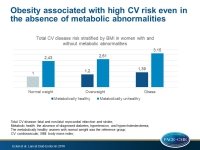Obesity associated with high CV risk even in the absence of metabolic abnormalities
CV risk is high in obese women without metabolic abnormalities, as well as in women with hypertension, diabetes or hypercholesterolemia, independently of their body mass index.
Transition from metabolic healthy to unhealthy phenotypes and association with cardiovascular disease risk across BMI categories in 90 257 women (the Nurses’ Health Study): 30 year follow-up from a prospective cohort studyLiterature - Eckel N, Li Y, Kuxhaus O, et al. - Lancet Diab Endocrin 2018; published online ahead of print
Introduction and Methods
Obese individuals may or may not have metabolic disorders, and those who are obese but metabolically healthy, are considered to have an intermediate CV risk, which seems to increase over time [1,2]. On the other hand, there are non-obese individuals with metabolic disorders and a high CV risk [3]. It is not clear how metabolic risk factors change in different body mass index (BMI) groups over time, and how these changes impact CV risk.
In this analysis of the Nurses’ Health Study (NHS) [4], the association between metabolic health and CVD risk was evaluated across BMI categories. Metabolic health was defined by the absence of diagnosed diabetes, hypertension, and hypercholesterolemia. After excluding women with a history of cancer or CVD, as well as those who were underweight, and those with missing BMI data, a study sample of 90,257 individuals was secured. Health status was assessed every 2 years based on questionnaires. The endpoints of interest were fatal and non-fatal myocardial infarction and stroke, and their combination was named total CVD.
Main results
- The median follow-up was 24 years with 2,127,391 person-years.
- Compared with metabolically healthy normal weight women, all groups of metabolically unhealthy women had a higher CV risk (HR for normal weight: 2.43; 95%CI: 2.19–2.68; HR for overweight: 2.61; 95%CI: 2.36–2.89; HR for obese: 3.15; 95%CI: 2.83–3.50).
- Within the metabolically healthy women, those who were overweight and obese had a higher CV risk compared with normal weight women (HR for overweight: 1.20; 95%CI: 1.04–1.39; HR for obese: 1.39; 95%CI: 1.15–1.68).
- Most metabolically healthy women in 1980, became metabolically unhealthy after 20 years in all BMI categories (84% of the obese and 68% of women with normal weight).
- In every BMI group, the CV risk of metabolically healthy women was lower compared with metabolically unhealthy women at baseline or compared with those who became metabolically unhealthy during follow-up. Still, women who were metabolically healthy obese at baseline and stayed healthy had an increased CV risk compared to women with stable metabolically healthy normal weight (HR: 1.34; 95%CI:1.10-1.64).
Conclusion
CV risk is very high for metabolically unhealthy women in all BMI categories. Obesity is a CV risk factor even when metabolic health is maintained during long periods of time. Most metabolically healthy women at baseline develop diabetes, hypertension or hypercholesterolemia in the long-term, independently of their BMI, which leads to an increase of their CV risk.
References
1. Stefan N, Haring HU, Hu FB, et al. Metabolically healthy obesity: epidemiology, mechanisms, and clinical implications. Lancet Diabetes Endocrinol 2013; 1: 152–62.
2. Kabat GC, Wu WY, Bea JW, et al. Metabolic phenotypes of obesity: frequency, correlates and change over time in a cohort of postmenopausal women. Int J Obes (Lond) 2017; 41: 170–77.
3. Lavie CJ, De Schutter A, Milani RV. Healthy obese versus unhealthy lean: the obesity paradox. Nat Rev Endocrinol 2015;11: 55–62.
4. Colditz GA, Manson JE, Hankinson SE. The Nurses’ Health Study: 20-year contribution to the understanding of health among women.J Womens Health 1997; 6: 49–62.

